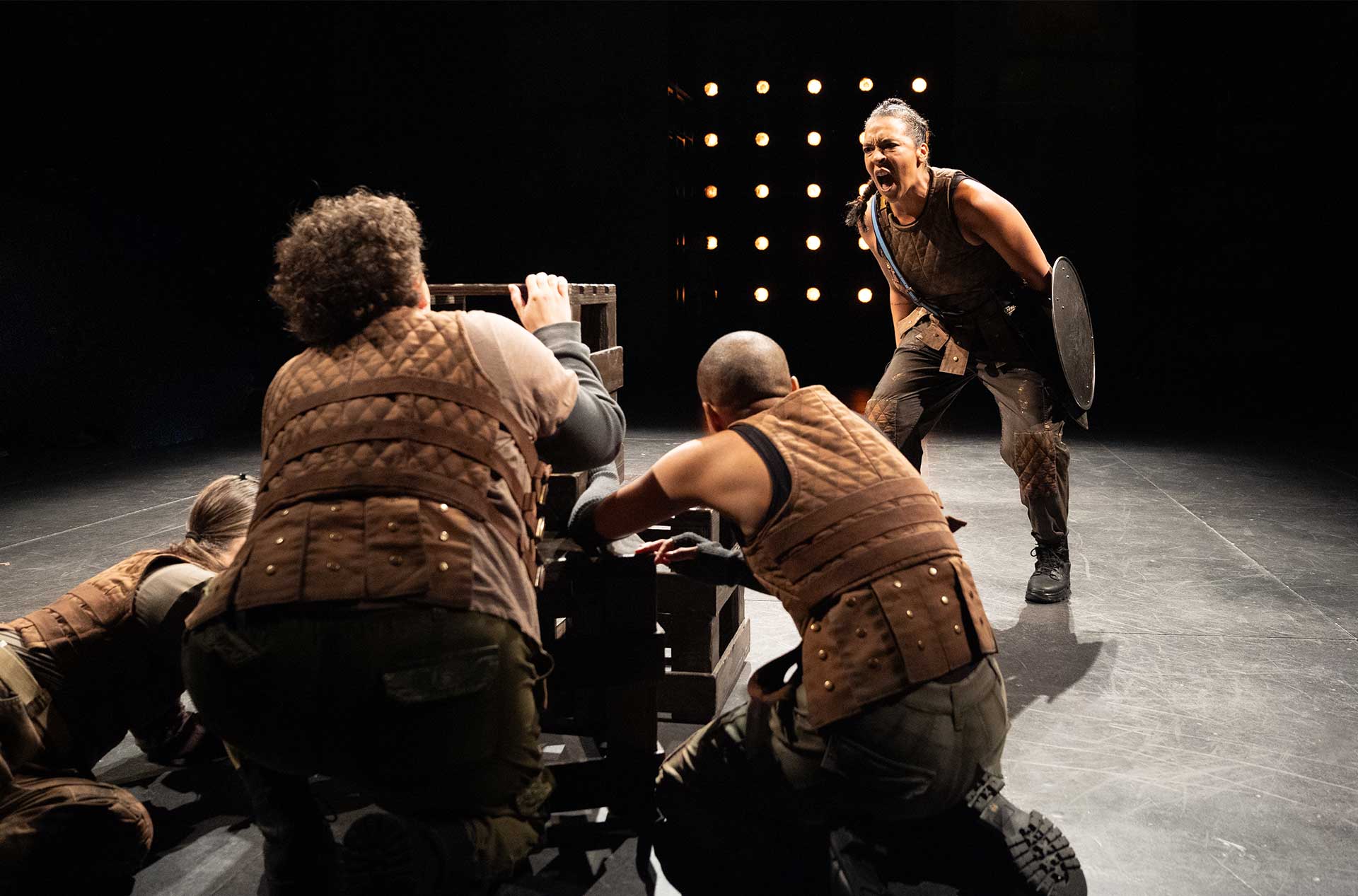Play promotional design by Krzysztof Bednarski (image provided by the OSF).
As fall term at Southern Oregon University begins, the Oregon Shakespeare Festival’s production of Coriolanus is entering its final weeks. I caught an eight P.M. showing of the play on September twenty-first, just over three weeks before it makes its final appearance in Ashland. The play, produced by OSF in partnership with upstart crow collective and Play on Shakespeare, is delivered through a modern verse translation by Sean San José. The play is directed by Rosa Joshi, and features a cast of eight female and non binary actors.
I was not familiar with Coriolanus, and prior to seeing the OSF’s production I was in good company. The play is one of Shakespeare’s less known and less produced works. It is believed to have been composed between 1605 and 1608, near the end of the playwright’s career (roughly contemporary to Macbeth, which the OSF produced earlier in the year, but before Pericles, Prince of Tyre, which Southern Oregon University’s Theater Department produced earlier in the year as well) and during the early years of King James I’s reign over England.
Coriolanus, however, is much less known than Macbeth and Julius Caesar, which is another Shakespearean play in a Roman setting that deals with similar themes. It is a tragedy on a grand scale that tells the story of the titular Gnaeus Marcius Coriolanus (Jessika D. Williams), a brave but bitterly proud Roman general that wins many battles on the field, but finds his personality ill suited to domestic Roman politics. The play’s setting is early in the fifth century B.C.E., which historically puts it within years of the overthrow of Rome’s monarchy and its transition to a Republic. In advertising for the production, the OSF repeatedly highlights the young Republic’s struggling, frayed democracy, claiming that its “themes of ambition and delicate democracy that will particularly resonate during an election year.”

Jessika D. Williams’s Coriolanus (image provided by the OSF)
In the play itself, the external wars Coriolanus commands are forced to take a backseat to the internal struggle between the Republic’s patrician aristocracy, which Coriolanus represents, and its oppressed plebeian underclass, which he loathes. Coriolanus is persuaded to run for consul, the highest office in the new Republic, but quickly runs afoul of Brutus and Sicinius (Rami Magron and Betsy Schwartz), the two tribunes that represent the plebeians. Coriolanus’s wounded pride and his refusal to control it quickly turns the people of Rome against him– and leads to his own defection to the very enemies he once beat off.
OSF’s production takes place in the Thomas Theater, a relatively small venue that gives it an intimate feel. I sat in the C row. In the play, violence and hunger are present everywhere. In its opening scenes, plebeians protest Rome’s ruling oligarchy, saying that there are storehouses filled with corn that are being withheld from them even as patricians like Coriolanus demand their help fighting their wars (a charge the patrician Menenius denies, although throughout the entire play, bags of corn are visible behind bars). The dangers of mob rule is another enduring theme. Like in Julius Caesar, the plebeians are fast to change their minds. In one of his fits of rage, Coriolanus refers to them as a hydra. The actors playing the mob frequently move in a serpentine way when their anger is aroused against Coriolanus or others.
Two characters dominate the performance. Coriolanus and his mother, Volumnia (Maria Porter). The costuming itself is limited, with many of the performers wearing simple leather tunics, leggings, and rubber boots that are all similar shades of brown (Coriolanus’s “campaign getup” is a burlap sack with “PROPERTY OF ROME” emblazoned in big, red text). Even though some of the original script’s characters are scrubbed from this adaptation, the cast of eight must frequently switch roles. This makes the use of the limited costuming (designed by Sara Ryung Clement) very impressive, if also a bit confusing, and serves to further highlight the proud Roman warrior and the equally tenacious woman that gave him his pride. The performance, which describes itself as a “powerful, movement-focused production”, seems to orbit around Coriolanus and Volumnia. The common people that Coriolanus so despises flinch and cower when he enters the stage and insults them to their faces. Music (supplied by Caroline Eng) booms through the theater when Coriolanus goes into battle.

A scene from Coriolanus (image provided by the OSF)
Contemporary criticisms of Coriolanus often noted that the titular character, unlike others among Shakespeare’s quasi historical subjects, spends little time in thought. I didn’t have this issue viewing the play. Coriolanus is a humble man and never hesitates to remind the viewer. But it is a fundamentally unconvincing humility. When he eschews the spoils of war from his initial victories and turns down the Senate’s praises, it’s difficult to get the impression that his stoic, Roman virtue is really about anyone other than himself. The great paradox at the character’s center, one the production spends an abundance of time exploring, is that Coriolanus is a man that does selfless things for selfish reasons. When the common people of Rome flip on Coriolanus, Coriolanus flips on them, offering his sword to the city’s (and his) sworn enemies, the Volsci.
If Coriolanus dominates every scene that he is in, then Volumnia dominates Coriolanus. She never shies away from mentioning that it was she who gave Coriolanus his Roman pride and warrior ethos, boasting to her son’s wife that it would be better to have eleven sons die in combat than one live a natural and comfortable life. When Coriolanus turns on his country, it is Volumnia that is able to shame him into making peace with his enemies. This is perhaps the ultimate sham in Coriolanus’s pride– it isn’t his own. Just as his own blind rage and entitlement drives him from folly to folly in his own city, so ultimately Coriolanus himself always answered to Volumnia.
Upstart crow collective is proud of the way that it interprets the play, traditionally considered a highly masculine one, with a cast of women and non binary actors. The play is an ambitious undertaking that seeks to explore mob rule, fragile democracy, and hubris. It doesn’t always make good on its promises. Despite its aspirations to explore the (historical) tension between the people of Rome and their masters, the production rarely delves into their plight beyond the easy way their own tribunes manipulate them. It is difficult to connect Coriolanus’s personal conflict with broader social themes like inequality, and at times it’s even difficult to really parse it together with the central issues facing Rome the play wishes to explore. Nonetheless, the play delivers where it counts, offering an accessible and thrilling interpretation of Shakespeare’s warrior tragedy that modernizes language without making it frivolous.
Coriolanus is available at the Oregon Shakespeare Festival through October 13th. Southern Oregon students enjoy a considerable discount when buying two tickets.



